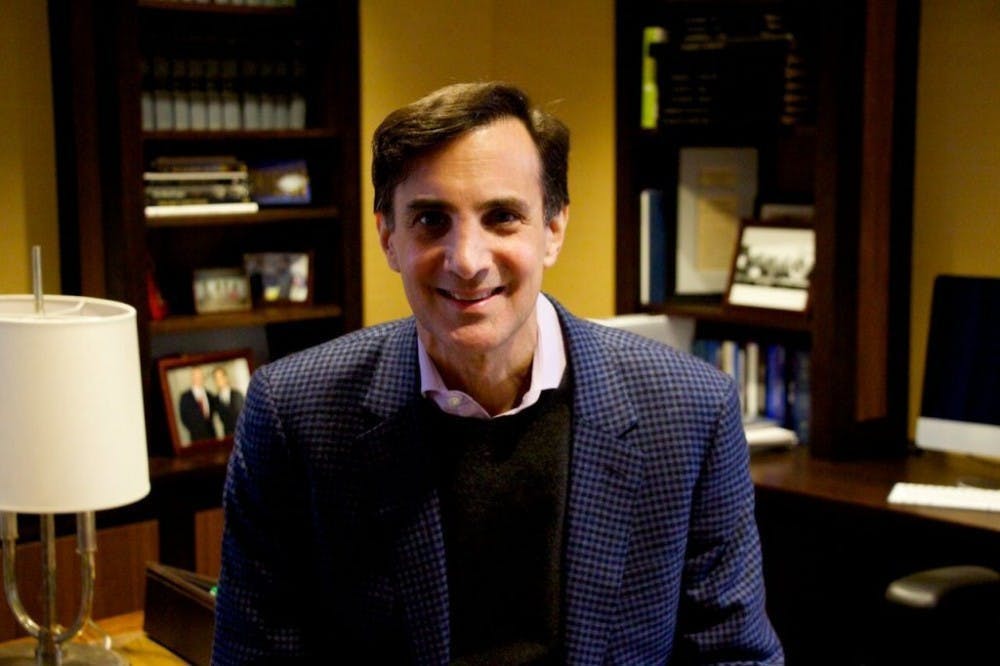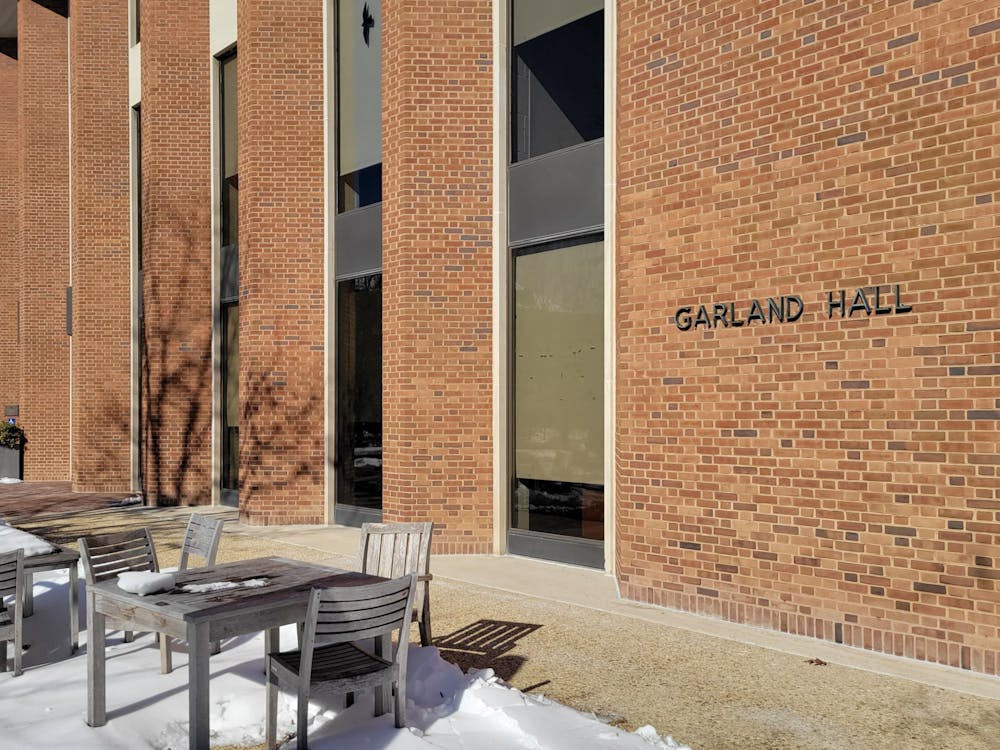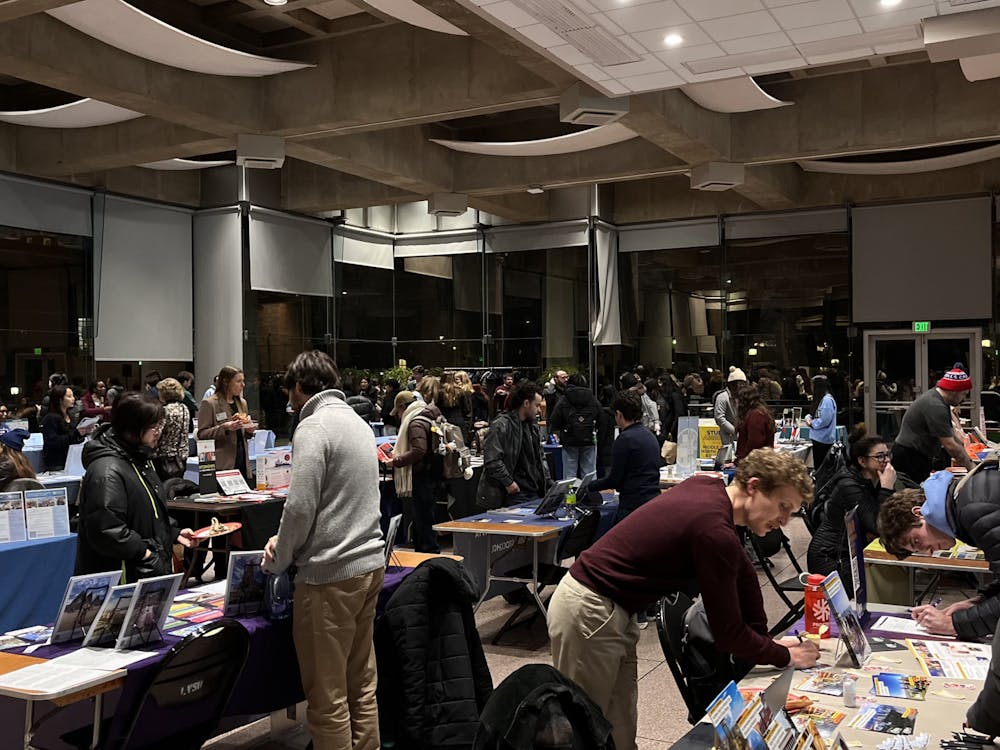In an interview with The News-Letter on Dec. 1, University President Ronald J. Daniels discussed democracy and governance at the University, the future of the Johns Hopkins Police Department (JHPD) and expectations for future COVID-19 policies on campus.
Democracy at the University
Daniels’ book, What Universities Owe Democracy, was published in October and focuses on the role universities can play in enabling students to become active participants in the democratic process.
He explained what he sees as a crucial function of American universities.
“American universities are critical sites sites for fueling democracy, for supporting democracy... We play... an ‘indispensable role’ in American democracy,” he said. “If all that is so, it seems to me that we've got to try and get at doing hard things... to respond to the magnitude of the challenges that democracy is facing in this moment.”
Daniels cited initiatives such as Democracy Day during Orientation Week, the Center for Social Concern and voter registration drives as University achievements that have led to increased student engagement and participation during election cycles.
He discussed his hopes for greater opportunities for students to engage in coursework focused on democratic values and diversity, as proposed in the Second Commission on Undergraduate Education (CUE2) final report.
“[In my book] I talk a lot about the importance of responding to what many regard as a very serious deficit in the understanding that students in American universities have of the values, the history, the institutions of American democracy,” he said. “One of the things I'm hopeful of is that the CUE2 report did talk about a citizenship and diversity requirement, and as the faculty work through that issue, I'm cautiously optimistic that there will at least be a set of offerings... so students can receive an opportunity to enhance their understanding of the foundations of American democracy.”
Naveeda Khan, an associate professor in the Department of Anthropology, stated in an email to The News-Letter that the corporatization of universities has contributed to the current state of democracy.
“Universities are not just privileged places for the exchanging of ideas,“ she wrote. “They are also products of the very problems that have brought American democracy to its current state, starting with American universities’ very eager participation in the promises of a rampant economy in which there has been a considerable blurring of lines between industry and research.”
Daniels commented on faculty members’ complaints about a lack of inclusion and shared governance in decision making.
“I look at things like the creation of the [University] Pandemic Academic Advisory [Committee (UPAAC)] that we stood up last year — that's a very powerful way in which the University is seeking to respond to those concerns about how we make decisions that are regarded as sound and legitimate from the perspective of a number of different stakeholder groups,” he said.
François Furstenberg, a professor in the Department of History, has been a vocal critic of University leadership for what he sees as its failure to consistently seek input from faculty and students. He elaborated on these critiques in an email to The News-Letter.
“Many faculty have felt concern and frustration in recent years at the increased levels of control exerted by the university’s senior leadership,“ he wrote. “Many people feel that Johns Hopkins has shifted away from traditions of deliberative decision making toward a more hierarchical, corporate model of governance where decisions get made by a relatively narrow group of trustees and members of the president’s ‘cabinet.’ Student[s], faculty and staff do not participate in these bodies, and as such have not had a say in decisions of great institutional significance.”
However, Furstenberg acknowledged recent University efforts to listen to its constituents.
“I do want to stress that I think things now seem to be moving in the right direction. The creation of the new faculty bodies like the UPAAC and the Krieger and Whiting senates bodes very well for an improved culture of governance at the institution,“ he wrote. “I very much hope that these bodies will be received by President Daniels, not as purely advisory to the president and board of trustees, but rather as equal partners in shared university governance.”
Freshman Ty’shera Mintz reflected on what she feels is a lack of student input and shared governance in decision making in an interview with The News-Letter.
“There needs to be more accountability,” she said. “Though we voice our opinions, it's beginning to feel like they are being ignored purposely.”
Daniels referred to newly created advisory bodies in the School of Engineering and at the across the entire University as signs of progress toward encouraging shared governance.
“We're seeing at the level of schools and at the level of the University these bodies being created, which I think are a great way to be able to share information, [to] get feedback and to make better decisions,” he said. “Shared governance is a really important principle. It requires a clear understanding of where governance overlaps, where there are clear rights that are vested in either academic leadership or faculty or student groups [and] where they come together, and then I think trying to ensure that these fora are well understood and that the kinds of debates that take place in them and the results of [them] are disseminated broadly within the campus.”
Policing
The University announced in June 2020 that plans for the JHPD would be suspended for a minimum of two years.
Daniels explained why the two-year pause was chosen.
“We knew that the state had declared it was going to embark on a very ambitious police-reform package to get at... the Law Enforcement Officers’ Bill of Rights (LEOBR),” he said. “That was something pretty foundational to the concerns that those people who were opposed to the police force had about the prospect of Hopkins standing up a small sworn force: That as accountable as you may be, and as much as the legislation dictates how you will do this better than other forces, [standing up a sworn police force is] still subjected to an override by the existing Law Enforcement Officers’ Bill of Rights... We felt that standing down while that issue gets resolved... was really important.”
Daniels expressed his confidence surrounding the University’s progress so far during the two-year pause.
“After literally two years of very active discussion [and] deliberation around... the importance of nonracialized community-based policing and clear accountability mechanisms... I feel that we'll be able to protect the community from the risks of violent crime while at the same time ensuring that the police force ultimately is accountable and behaves in a manner that we must expect of policing in the University and indeed in America,” he said.
Daniels asserted that the appointment of Branville Bard Jr. as vice president of public safety was a promising step for the University. According to Daniels, Bard, who was formerly the police commissioner of Cambridge, Mass., has a well-established record of leading a police force in a city that has large and complex university and health systems while still ensuring that that force was held accountable.
Daniels also explained that the two-year pause gave the University the opportunity to implement experimental projects that could reduce reliance on sworn policing altogether.
“We could... use this time to create some innovative projects that draw on the University’s — particularly [the] public health school’s — expertise in problems related to the root causes of criminal violence in the community, and that, of course, sparked the $6 million Innovation Fund [for Community Safety],” he said. “By standing up the Innovation Fund, [and] with a Behavioral Health Crisis Response Team, we thought that was just a better way to proceed.”
Despite criticism from members of the student body, faculty and community, the University has not changed its stance on implementing the JHPD. Daniels told The News-Letter why he believes a police force is still necessary despite pushback.
“At the highest level, it starts off with a concern for the safety and security of all of our stakeholders on our campuses in Baltimore, given that we happen to dwell within a city that has very serious challenges and violent crime,” he said. “We are, sadly, one of the cities that has the highest levels of per capita murders of any city in the country.”
Daniels cited several recent incidents near campus as causes for alarm in the Hopkins community, including several carjackings, two robberies at the on-campus 7/11 and a racially motivated assault in East Baltimore.
Daniels also stressed that two recent active shooter incidents on nearby campuses, one at Towson University and the other at Morgan State University, exemplify the need for a sworn police force.
“What's important is in each of those incidents, it was sworn campus policing that were among the first responders to those acts. They knew where to go, they were trained for a university community and they were there quickly,” he said. “That just again underscores to my mind why having a small, really well trained, progressive police force that's highly accountable is absolutely essential for the safety and security of the community.”
COVID-19
The University has yet to officially announce its plans for on-campus activities in the spring semester. Daniels emphasized that the University will continue to use the same sources of input as it has in the past to make its decisions regarding spring semester guidelines.
He pointed to various advisory bodies, including the Planning Student Advisory Committee, as essential to the development of public health guidelines.
“We’ll rely on the best possible medical and public health advice that we can get from within the institution,” he said.
In light of the COVID-19 Omicron variant, the University will likely continue to mandate regular testing, masking and enhanced ventilation to mitigate the spread of the disease, according to Daniels.
With recent approval of Pfizer-BioNTech and Moderna booster shots by the Centers for Disease Control, Daniels spoke about the University’s plans for providing booster shots.
“We're going to embark — within the next week or so — on an information campaign around boosters,” he said. “We're also going to have a number of clinics on campus so it's easy for people who are here to get boosters.”
Daniels also discussed plans for a potential booster shot mandate.
“We want to make sure that the data are supportive of [requiring booster shots] coupled with the ability that if we're going to mandate it, that we've got a good distribution network [and] that we can make it easy for people to access the booster,” he said.
As of Dec. 10, the University has observed a total of 455 COVID-19 cases among professors and students according to an email sent out by the Office of Communications. Daniels is hopeful that if affiliates continue to adhere to COVID-19 guidelines, the University may relax its protocols for the spring semester.
In an interview with The News-Letter, sophomore Seth Berke shared his thoughts on how COVID-19 has been handled this semester.
“As far as I can tell... people are doing a good job wearing masks, [and] I think one test a week is a good idea,” he said.
Berke, a member of the men’s water polo team, felt that the University had been accommodating of the needs of his team during the fall season. According to him, COVID-19 restrictions did not hinder the team’s practice or competition schedules. He hopes that the University will continue to enforce the same guidelines next semester but also that some protocols like crowd density restrictions in dining halls will be relaxed.





